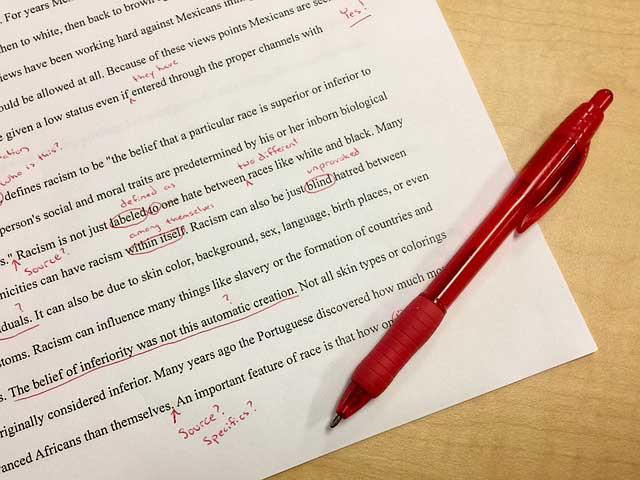Developmental Editing for Nonfiction Writers: A Complete Guide
Many writers think that developmental editors are reserved for works of fiction, where they can flesh out characters and help identify holes in the plot, among other tasks.
But here’s the thing, while those tasks are critical for the success of a story, developmental editors are as — if not more — critical for works of nonfiction.
See, holes in the plot of a story typically lead to a bad story, but holes in the development of a nonfiction book can lead to reputational damage for the author, or worse yet, to expensive lawsuits.
For this reason, developmental editors in the world of nonfiction tend to specialize in specific areas of knowledge, such as finance, health, psychology, etc.
In order to find “holes” in nonfiction subjects they need to have a thorough understanding of the topic, which makes them a central player in the publication of the nonfiction genre.
In this article, I’m going to provide you with a comprehensive understanding of developmental editing and its benefits for nonfiction writers, including what you need to know before you hire an editor for your next project.
What Is Developmental Editing?
Developmental editing focuses on the big picture, including the structure, content, and organization of your nonfiction manuscript.
They’ll work with you to shape your manuscript into its best possible form prior to publication, but what they do goes beyond simply fixing typos or grammar mistakes.
Their job is to help you craft a clear and engaging narrative that covers all the required bases, organizes your material in the most logical way for readers and presents it in a way that resonates with them.
Examples of developmental editing tasks include:
- Analyzing the structure of your manuscript
- Enhancing readability and flow
- Ensuring consistency of facts and data
- Identifying and addressing issues with your book’s main theme (i.e. “holes”)
- Ensuring your manuscript is structured effectively
- Helping you identify and address any weaknesses in your writing
- Helping you clarify your message and refine your style for maximum reader engagement
Why Is Developmental Editing Important?

Developmental editing is an essential step in the nonfiction writing process for the following reasons:
It helps you develop a strong narrative
In nonfiction writing, your narrative is what keeps the reader engaged and interested in the book, especially if the subject matter is complex or dry in nature.
A developmental editor can help you craft a compelling narrative by providing feedback on the structure, pacing, and flow of your manuscript.
It helps you ensure consistency
Nonfiction books often contain a lot of information, which can make it easy to overlook inconsistencies in the writing.
A developmental editor can help you ensure that the information in the book is consistent and accurate from cover to cover.
It helps you identify and address structural issues
Structural issues can make it difficult for readers to follow your narrative or understand the message of your book.
A developmental editor can help you identify and address any structural issues in the manuscript and suggest corrections.
It helps you clarify your message
The central message in your book is what makes it impactful and memorable. A developmental editor can help you clarify it and ensure that it resonates with your readers.
What’s the Difference Between Developmental Editing and Copyediting?
Now, many novice writers confuse developmental editing with copyediting, so it’s important to understand the difference between the two.
While both types of editing are important, they serve different purposes:
Developmental editing focuses on the big picture of your manuscript, including its structure, content, and organization. A developmental editor will provide you with feedback on your narrative, thesis development, clarity, and more.
Copyediting, on the other hand, focuses on the smaller details, such as grammar, spelling, and punctuation. A copyeditor will ensure that your manuscript is error-free and that it follows the conventions of standard English.
What’s Specifically Included In Developmental Editing?

Here are some of the things that are typically included in developmental editing:
Analysis of content and structure: A developmental editor will look at the overall structure of your book, looking for gaps or areas that need further development.
Suggestions for rewriting and revision: They’ll provide you with suggestions for rewriting and revisions based on their analysis of your book.
They may suggest deleting or adding chapters, changing their order, or adding more details or explanations.
Guidance on genre conventions: Developmental editors will also provide guidance on the conventions and expectations of your specific nonfiction genre, ensuring you meet industry standards and readers’ expectations.
Assistance with pacing and flow: Pacing and flow is not reserved to works of fiction. Nonfiction books need to be easy to read as well, especially given the often complex or multi-layered subject matter.
A developmental editor can help you to improve the pacing and flow of your book, ensuring that your readers stay engaged from beginning to end.
Feedback on writing style: A developmental editor can provide feedback on your writing style, helping you to refine your voice and tone.
They can help you to eliminate repetitive or awkward phrasing, and ensure that your writing is clear and concise.
Suggestions for marketing and publishing: Finally, a developmental editor can provide suggestions for marketing and publishing your book.
They may suggest changes to your title or cover design, or provide guidance on how to write an effective book blurb.
Overall, developmental editing is a collaborative process between the author and editor. It’s designed to help you to refine your book, ensuring that it’s the best it can be before you bring it to market.
Should I Hire a Developmental Editor?
As a nonfiction writer, hiring a developmental editor is incredibly helpful in ensuring you’ll have a vetted, competitive product in the marketplace.
However, they can be expensive, so it’s important to consider whether it’s the right investment for you at the time.
In other words, if you’re just starting out as a nonfiction writer and don’t have the required funds, you may want to focus on improving your writing skills before you decide to publish a book.
But if you have the budget and you’re ready to take your writing to the next level, a developmental editor can be an invaluable resource.
Look for an editor with experience in your genre and with positive reviews from previous clients (always ask for references from other authors you can actually talk to!).
It’s also a good idea to ask for published titles they’ve edited in the past so you can purchase them to see if the editor’s style and approach are a good fit for you.
Tips for Working with a Developmental Editor

Once you decide to hire an editor, and in order to have a good working relationship, it’s important to work as a team of equals. So, here are a few tips to help you build a strong rapport from the get go:
Be open-minded and receptive to feedback: Remember that developmental editing is a collaborative process and your editor’s feedback is meant to help you improve your work.
It’s essential to approach their suggestions with an open mind and a willingness to make changes that will benefit your book. Never take their criticism or feedback personally, they’re just trying to help you!
Communicate clearly with your editor: As with any collaborative effort, clear communication is key. Be sure to share your goals and expectations for the book, as well as any concerns or questions you may have, with your editor upfront.
This will help ensure that you’re both on the same page and working toward a common vision.
Respect your editor’s expertise: Your editor is a professional with years of experience in the field, and their feedback is grounded in that expertise. Trust their insights and suggestions and be open to learning from them.
Don’t rush the process: Developmental editing takes time, and it’s important not to rush through it.
Give yourself and your editor enough time to review the manuscript thoroughly and make the necessary changes. Rushing through this process can compromise the quality of your book.
Keep an open line of communication throughout the process: Check-in with your editor regularly, provide updates on your progress, and ask any questions you may have. Don’t let too much time pass without communicating with them.
Be willing to make changes: As mentioned earlier, developmental editing often involves making significant changes to your manuscript. Be prepared to make those changes and trust that they’ll improve the overall quality of your book.
Wrapping Things Up
Developmental editing is a crucial step in the nonfiction writing process. It’ll help you refine your ideas, improve your writing, and ensure that your book is the best it can be.
By working with a skilled developmental editor, you’ll be able to take your work to the next level and create a nonfiction book that truly resonates with your readers.
So, if you’re ready to take your nonfiction book to the next level, consider hiring a developmental editor. With their expertise and guidance, you may be able to turn your book into a powerful tool that’ll inform, inspire, and help readers for years to come.

Harry Wallett is the Managing Director of Cascadia Author Services. He has a decade of experience as the Founder and Managing Director of Relay Publishing, which has sold over 3 million copies of books in all genres for its authors, and looks after a team of 50+ industry professionals working across the world.
Harry is inspired by the process of book creation and is passionate about the stories and characters behind the prose. He loves working with the writers and has shepherded 1000s of titles to publication over the years. He knows first-hand what it takes to not only create an unputdownable book, but also how to get it into the hands of the right readers for success.
Books are still one of the most powerful mediums to communicate ideas and establish indisputable authority in a field, boosting your reach and stature. But publishing isn’t a quick and easy process—nor should it be, or everyone would do it!
2 responses to “Developmental Editing for Nonfiction Writers: A Complete Guide”
-

My native language is Danish. I have written a book about being an artist and about painting. I plan to publish in English on Amazon KDP.
My English is good and my translation is good/OK, but I don’t write like an English writer.
Question: Do I need a developmental editor or a copy editor?-

Hi Henrik!
Apologies for the delay in my reply.
It’s great to hear about your book project! Given your situation, here’s a bit of guidance:
A developmental editor would help you with the overall structure, content, and flow of your book. They focus on the big picture, including the organization of chapters, coherence of ideas, and overall narrative.
A copy editor, on the other hand, would focus on the finer details. They would correct grammar, punctuation, and style issues to ensure that your writing is clear and reads smoothly.
Since you mentioned that your English is good but you don’t write like a native English writer, you might benefit from both types of editing. However, if you have to choose one:
If you’re confident in the overall structure and content of your book but want to ensure that the language is polished and professional, a copy editor would be the best choice.
If you feel that your book might need more help with organization, clarity of ideas, and overall presentation, you might want to consider a developmental editor first.You can also consider starting with a developmental editor and then moving on to a copy editor for the final polish. This two-step approach can be very effective.
-








Leave a Reply